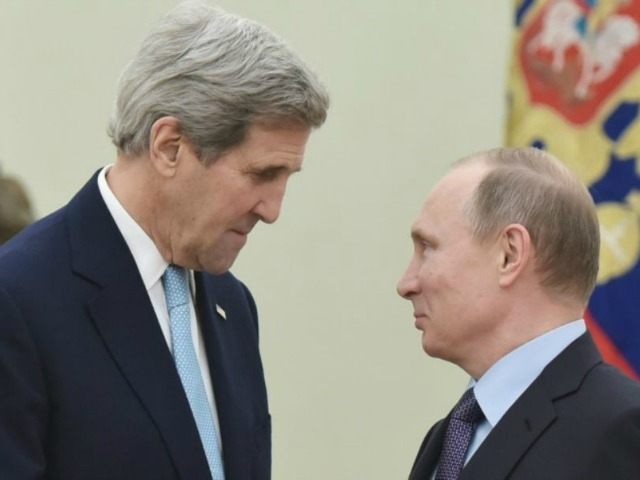Secretary of State John Kerry and Russian President Vladimir Putin agreed that al-Qaeda’s al-Nusra Front and the Islamic State (ISIS/ISIL) should not participate in any Syria peace talks.
The declaration follows Kerry’s remark that he expected “real progress” on Syria to come out of this meeting.
The officials did not mention other groups involved in the Syrian civil war. The U.S.-led coalition devoted time and resources to arming and training the rebels, while the Kremlin chose to bomb them, beginning an airstrike campaign on September 30. Putin insisted the warplanes targeted only ISIS, but evidence suggests they have mostly targeted non-ISIS opponents of Syrian dictator Bashar al-Assad.
Both sides of the U.S.-Russia talks allegedly came closer to agreeing on a list of terrorist groups in the country. They also agreed that terrorism is dangerous for everyone.
“We confirmed today the accords reached between the Russian and US military and agreements concerning the US-led coalition on the fight against the Islamic State,” declared Russian Foreign Minister Sergei Lavrov.
Also, once again, the U.S. cannot make a firm stand on Assad’s status in Syria. Kerry claimed the U.S. and its allies do not seek a different regime in Syria, directly contradicting public statements by President Barack Obama.
“The United States and our partners are not seeking so-called regime change,” he said at a press conference.
On September 28, President Barack Obama told the UN General Assembly that Assad must go. Yet, ten days before, Kerry said Syria needs Assad to achieve peace. Obama has shown sides of wavering after years of demanding Assad’s removal. But his staff butts heads in public:
Everyone at the top level of the Obama administration agrees with the president that resolving the civil war in Syria is necessary to defeat the Islamic State. But when other officials talk about how to fight terrorism in the Middle East, they emphasize that ending Assad’s rule is a crucial and necessary part of that plan.
Kerry said Friday at a press conference in Greece that the exact circumstances of Assad’s departure were negotiable, but that his status would have to be settled before the war could end. On Sunday, National Security Advisor Susan Rice was even more direct during a CNN interview: “We think Assad, by virtue of killing hundreds of thousands of his own citizens, has lost all legitimacy. He has to go.”
Unlike the U.S., the Kremlin has never wavered in its support of Assad or Syria. Russian Foreign Ministry spokeswoman Maria Zakharova told radio stations in November that the government “never said” it is “crucial” for Assad to remain in power.
“What we did say is a regime change in Syria could become a local or even regional catastrophe,” she explained, while insisting “only the Syrian people can decide the president’s fate.”
Kerry asserted the U.S. does not want “to isolate Russia,” despite the numerous economic sanctions against the Kremlin after Putin annexed Crimea from Ukraine. In his earlier meeting with Lavrov, Kerry hoped to find a resolution for the Ukraine crisis. East Ukraine has been in a civil war since March 2014. Russian soldiers and pro-Russian rebels retaliated against the pro-West Parliament by ousting Russian-backed President Viktor Yanukovych. Ceasefire meetings between Ukraine, Russia, Germany, and France occurred in Minsk, Belarus, in September 2014 and February 2015, but neither one has resulted in permanent action. Kerry demanded Russia cooperate in the ceasefire, but Lavrov dismissed the suggestion. He placed “responsibility” on Washington.
“Of course, we would like to continue the dialogue … on how the United States can assist with the Ukrainian settlement,” he said. “Given the U.S. influence on Kiev, it would be a positive factor.”

COMMENTS
Please let us know if you're having issues with commenting.